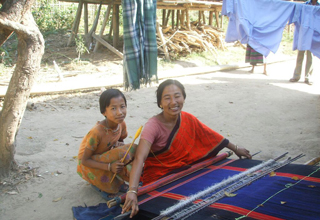NEW DELHI, Sep 13: The Centre will soon grant citizenship to nearly one lakh Chakma and Hajong refugees, who came from the erstwhile East Pakistan five decades ago and are living in camps in the Northeast, officials said today.
The Chakma-Hajong refugee issue was discussed threadbare today at a high level meeting convened by Union Home Minister Rajnath Singh and attended by Arunachal Pradesh Chief Minister Pema Khandu, Union Minister of State for Home Kiren Rijiju and National Security Advisor Ajit Doval, among others.
In 2015, the Supreme Court had directed the Central government to grant citizenship to the Chakma and Hajong refugees, mostly staying in Arunachal Pradesh.
“The Supreme Court order on Chakmas and Hajongs was discussed in the meeting. We need to implement the order as early as possible,” a Home Ministry official said.
Chakmas and Hajongs not entitled to land rights or ILP relaxation: Kiren
Speaking to this daily, Union Minister of Home, Kiren Rijiju said that though Chakmas and Hajongs have been granted citizenship, it will not have rights as that of indigenous communities of Arunachal. He further said that ILP will not be relaxed for the Chakmas and Hajongs in the state. Kiren further said that refugee issue is a legacy handed down by the Congress.
Arunachal cannot be a dumping ground and the government will not allow any fresh refugees to come in to the state, he said.
Chief Minister Pema Khandu put forth the concerns of Arunachal Pradesh, in relation to protecting the indigenous population of the state. He said while referring to the BEFR Act 1873, “The ethnic composition of the state is an important aspect which needs to be safeguarded”.
He requested the Home Ministry to revive the Joint High Power Committee to be headed by a MOS. Proposal for constitution of a State High Power Committee is also under process, he said while adding that the matter on citizenship is subjudice and the state government has filed an SLP in the Supreme Court.
Appealing to the indigenous people of Arunachal Pradesh not to panic, state Bharatiya Janata Party President Tapir Gao said that the Chakmas and Hajongs have been granted Indian citizenship only and have not been granted Arunachal Pradesh Scheduled Tribe (APST) status.
He said that the Chamkas and Hajongs would be treated at par with other Indian citizens and would require Inner Line Permits like all other Indian citizens.
Clarifying that this is the directive of the Supreme Court and not the decision of the Modi-led or Pema-led governments, Gao said that the state government and central Home Ministry would identify original Chakmas and Hajongs settlers of 1964-65 and submit an affidavit to the Supreme Court on their current status.
On the basis of the status report, the Government of India will grant citizenship to selected Chakmas and Hajongs, who genuinely qualify for the citizenship.
Reiterating that the tribal identity of the state would not be disturbed, Gao assured that the central and state governments would come up with a logical conclusion to safeguard the indigenous tribal rights.
Strongly opposing the move of the Home Ministry, Peoples’ Party of Arunachal President Kahfa Bengia said that granting citizenship to the Chakmas and Hajongs would threaten the existence of the indigenous people of the state.
Concerned that the refugees may next stake claim over the Scheduled Tribe status, he said, “Chakmas and Hajongs should not be granted citizenship till they are settled in Arunachal Pradesh. Their citizenship in the country should be allowed only after they are deported from here.”
Meanwhile, Joint Action Committee on Chakma Hajong Issue Namsai (JACCHIN), an umbrella organisation of various civil societies and student bodies have expressed strong concern over the possible implications following grant of citizenship to the Chakmas and Hajongs.
Even though the refugees will not be entitled to the rights as enjoyed by the Scheduled Tribes of the state and will be required to possess ILPs, the demography of the area will be greatly affected and is sure to lead to political annihilation in the future, the organisation said. The organisation has asked the centre and state regarding the measures taken to safeguard the customary, economic and political rights of the indigenous population, reports Indrajeet Namchoom from Namsai.
Chakmas demand land rights
Meanwhile, Arunachal Pradesh Chakma Students Union (APCSU) has welcomed the decision of the Centre in compliance of the 2015 Supreme Court ruling even though it sought right to land.
If media reports of not giving land rights and other attending rights are true, it is a matter of concern, not acceptable and violates the court’s unambiguous ruling, it said in an e-mail to this daily.
“The Chakmas as citizens should get all the rights as accrued to citizens for their development. They have been suffering for more than 50 years despite always being pro-Indians prior to the partition.
Obviously Chakmas do not deserve further deprivation for hoisting the national flag”, it said.
It further said that “the population of Chakmas has been exaggerated deliberately to make it an issue. Official records show that the population is between 48000 to 54000 as per 2011 census and state government survey as against 100,000”.



